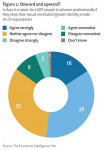Japanese companies to look further afield for innovative talent
Following on from a global survey of 179 senior executives on the same topic conducted in mid-2009, this report analyses the results of a new survey of 50 senior executives from Japanese companies, contrasting their views with the results of the earlier research. It reveals several aspects of talent-management strategy that are unique to Japanese companies—and suggests ways in which the pressures of competition and globalisation are forcing them to modify these strategies. Its key findings include:
· The pressures of globalisation and competition mean Japanese companies will have to look farther afield for talent. Japanese companies are certainly aware of the need to attract employees from a broader pool of talent: 82% of survey respondents think the availability of talent is a vital external factor for innovation strategy, far higher than the 55% of global companies that think so. Increasingly this means they will have to go where the talent is: 48% think their companies will “locate innovation centres where there is an abundance of talent” in five years’ time, versus 39% of firms in the global survey.
· Japanese companies place less emphasis on the importance of talent management in their organisation‘s ability to innovate, and consequently delegate responsibility for it lower down the chain of seniority. In the survey 56% of Japanese respondents say that talent management is a very important factor in their organisation’s ability to innovate, compared to 75% globally. Consequently just 38% of Japanese companies report that C-level executives have responsibility for the formulation of talent-management strategy, compared to 65% in the global results. But they think this is changing: 51% of respondents in the Japanese survey expect C-suite executives will be more involved in defining strategy in five years’ time, compared to 38% in the global survey.
· Japanese companies are more likely to employ structured, long-term talent-management strategies, and rely on internal development. Employee loyalty and a lack of labour mobility mean many Japanese companies place a greater emphasis on graduate schemes to attract talent, and internal training schemes to develop it. But these characteristics are changing with the demands of global competition: although 78% of respondents in Japan say training internal staff to fill key positions is a major part of their talent-management strategy now, only 24% expect this to be the case in five years’ time.
· Japanese companies tend to value technical knowledge and learning ability over creativity and entrepreneurship. The surveys uphold the common perception that Japanese companies value different attributes in their search for talent than those elsewhere in the world. The most highly-valued attributes are the ability to learn quickly (cited by 78% of respondents) and a high degree of technical knowledge (60%), while respondents in the global survey placed a higher value on creativity and collaboration.
About the research
A total of 50 executives from Japanese companies with annual sales of between US$250m and US$10bn took part in the online survey. Some 72% of respondents were C-level executives and the remainder were senior vice-presidents, vice-presidents, directors or managers. Some 40% of respondents are in the HR department. Respondents represented a range of industries, with 32% coming from the manufacturing sector, 22% from retailing and 16% from consumer goods.
About the Economist Intelligence Unit
The Economist Intelligence Unit is the business information arm of The Economist Group, publisher of The Economist. Through our global network of more than 650 analysts and contributors, we continuously assess and forecast political, economic and business conditions in more than 200 countries. As the world's leading provider of country intelligence, we help executives make better business decisions by providing timely, reliable and impartial analysis on worldwide market trends and business strategies. For more information, please visit www.eiu.com or follow us on www.twitter.com/theeiu
웹사이트: http://www.eiu.com
연락처
Joanne McKenna
press liaison
+44 (0)20 7576 8188
이메일 보내기
이 보도자료는 Economist Intelligence Unit가(이) 작성해 뉴스와이어 서비스를 통해 배포한 뉴스입니다.




